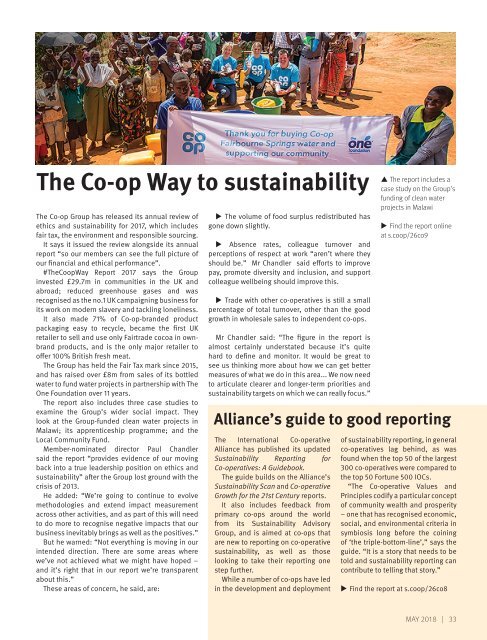MAY 2018
The May 2018 edition of Co-op News: connecting, challenging and championing the global co-operative movement. This issue shines a spotlight on governance – and how co-operatives do it differently. We also look at co-ops on the agenda in Westminster, sustainability supporting and preview some of the motions being put to the vote at the Co-op Group AGM.
The May 2018 edition of Co-op News: connecting, challenging and championing the global co-operative movement. This issue shines a spotlight on governance – and how co-operatives do it differently. We also look at co-ops on the agenda in Westminster, sustainability supporting and preview some of the motions being put to the vote at the Co-op Group AGM.
You also want an ePaper? Increase the reach of your titles
YUMPU automatically turns print PDFs into web optimized ePapers that Google loves.
The Co-op Way to sustainability<br />
The Co-op Group has released its annual review of<br />
ethics and sustainability for 2017, which includes<br />
fair tax, the environment and responsible sourcing.<br />
It says it issued the review alongside its annual<br />
report “so our members can see the full picture of<br />
our financial and ethical performance”.<br />
#TheCoopWay Report 2017 says the Group<br />
invested £29.7m in communities in the UK and<br />
abroad; reduced greenhouse gases and was<br />
recognised as the no.1 UK campaigning business for<br />
its work on modern slavery and tackling loneliness.<br />
It also made 71% of Co-op-branded product<br />
packaging easy to recycle, became the first UK<br />
retailer to sell and use only Fairtrade cocoa in ownbrand<br />
products, and is the only major retailer to<br />
offer 100% British fresh meat.<br />
The Group has held the Fair Tax mark since 2015,<br />
and has raised over £8m from sales of its bottled<br />
water to fund water projects in partnership with The<br />
One Foundation over 11 years.<br />
The report also includes three case studies to<br />
examine the Group’s wider social impact. They<br />
look at the Group-funded clean water projects in<br />
Malawi; its apprenticeship programme; and the<br />
Local Community Fund.<br />
Member-nominated director Paul Chandler<br />
said the report “provides evidence of our moving<br />
back into a true leadership position on ethics and<br />
sustainability” after the Group lost ground with the<br />
crisis of 2013.<br />
He added: “We’re going to continue to evolve<br />
methodologies and extend impact measurement<br />
across other activities, and as part of this will need<br />
to do more to recognise negative impacts that our<br />
business inevitably brings as well as the positives.”<br />
But he warned: “Not everything is moving in our<br />
intended direction. There are some areas where<br />
we’ve not achieved what we might have hoped –<br />
and it’s right that in our report we’re transparent<br />
about this.”<br />
These areas of concern, he said, are:<br />
u The volume of food surplus redistributed has<br />
gone down slightly.<br />
u Absence rates, colleague turnover and<br />
perceptions of respect at work “aren’t where they<br />
should be.” Mr Chandler said efforts to improve<br />
pay, promote diversity and inclusion, and support<br />
colleague wellbeing should improve this.<br />
u Trade with other co-operatives is still a small<br />
percentage of total turnover, other than the good<br />
growth in wholesale sales to independent co-ops.<br />
Mr Chandler said: “The figure in the report is<br />
almost certainly understated because it’s quite<br />
hard to define and monitor. It would be great to<br />
see us thinking more about how we can get better<br />
measures of what we do in this area... We now need<br />
to articulate clearer and longer-term priorities and<br />
sustainability targets on which we can really focus.”<br />
p The report includes a<br />
case study on the Group’s<br />
funding of clean water<br />
projects in Malawi<br />
u Find the report online<br />
at s.coop/26co9<br />
Alliance’s guide to good reporting<br />
The International Co-operative<br />
Alliance has published its updated<br />
Sustainability Reporting for<br />
Co-operatives: A Guidebook.<br />
The guide builds on the Alliance’s<br />
Sustainability Scan and Co-operative<br />
Growth for the 21st Century reports.<br />
It also includes feedback from<br />
primary co-ops around the world<br />
from its Sustainability Advisory<br />
Group, and is aimed at co-ops that<br />
are new to reporting on co-operative<br />
sustainability, as well as those<br />
looking to take their reporting one<br />
step further.<br />
While a number of co-ops have led<br />
in the development and deployment<br />
of sustainability reporting, in general<br />
co-operatives lag behind, as was<br />
found when the top 50 of the largest<br />
300 co-operatives were compared to<br />
the top 50 Fortune 500 IOCs.<br />
“The Co-operative Values and<br />
Principles codify a particular concept<br />
of community wealth and prosperity<br />
– one that has recognised economic,<br />
social, and environmental criteria in<br />
symbiosis long before the coining<br />
of ‘the triple-bottom-line’,” says the<br />
guide. “It is a story that needs to be<br />
told and sustainability reporting can<br />
contribute to telling that story.”<br />
u Find the report at s.coop/26co8<br />
<strong>MAY</strong> <strong>2018</strong> | 33


















